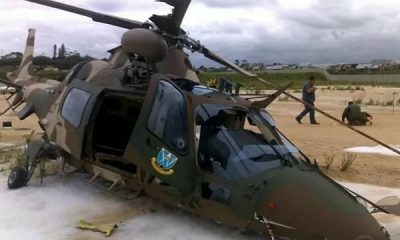National
NAF trains education officers on innovative teaching, learning Training

The Nigerian Air Force (NAF) has organised a training on improving innovative teaching and learning for its education officers, quality assurance officers and Head Teachers of its primary schools.
Declaring the training open on Tuesday in Jos, Air Marshal Hassan Abubakar, the Chief of the Air Staff (CAS), said that the exercise was timely.
Represented by Air Commodore Garba Bello, the Commandant, Air Police Training Centre, Kerang in Plateau, Abubakar said that the training was part of his philosophy anchored on “Deliberate Training and Mission-Oriented Force Development”.
”The selection of the conference theme ‘Improving Innovative Teaching and Learning Processes in NAF Education System for Enhanced Scholarly Performance,’ is timely and most apt for this conference.
”This is because modern societies are developing educational technology tools to make lesson delivery more effective.
”Technology makes learning engaging for students and they learn better, remember better and also apply knowledge better to real life.
”The purpose of this conference is to set the stage to have a balanced and advanced NAF education system, a system that is manned by a crop of well-trained education staff under the effective leadership of trained, current and dedicated educational administrators.
”It is expected that you will come out with practical resolutions that would translate to better educational services driven by technological innovations,” he said.
Abubakar, who commended NAF’s Directorate of Education for organising the training, urged participants to effectively combine their responsibilities as education officer and military personnel.
He explained that the increasing demand for admission into NAF schools suggests quality standard of teaching and learning in the schools.
”The overwhelming demand for admission into NAF schools by both service personnel and civilians alike, is a testimony that the schools are well administered and of enviable standards.
”The Senior School Certificate Examination (SSCE) results of NAF secondary schools in the recent past attest to the high academic standards of the schools.
”We will continue to provide the requisite support that will propel the directorate of education to greater heights.
”But I must draw the attention of serving education officers to the importance of effectively combining responsibility as education service providers with statutory military responsibilities,” he said.
He, however, charged the participants to constantly update their knowledge and skills so as to keep pace with international best practices, especially in the field of education.
The CAS further assured the participants of its continued support for viable educational policies and programmes that would create a conducive environment for teaching and learning in NAF schools.
Headline
EFCC bars dollar transactions, orders embassies to charge in naira

The Economic and Financial Crimes Commission has barred foreign missions based in Nigeria from transacting in foreign currencies and mandated them to use Naira in their financial businesses.
The EFCC has also mandated Nigerian foreign missions domiciled abroad to accept Naira in their financial businesses.
The anti-graft agency said the move is to tackle the dollarisation of the Nigerian economy and the degradation of the naira
The Commission, therefore, asked the government to stop foreign missions in Nigeria from charging visa and other consular services in foreign denominations.
The EFCC gave the advisory in a letter to the Minister of Foreign Affairs, Amb. Yusuf Tuggar, for onward transmission to all foreign missions in the country.
In the letter, the EFCC said it issued the advisory because the practice of paying for consular services in dollars was in conflict with extant laws and financial regulations in Nigeria.
In a letter dated April 5, 2024, which was addressed to the Minister of Foreign Affairs, Ambassador Yusuf Tuggar, titled: “EFCC Advisory to Foreign Missions against Invoicing in US Dollar,” the EFCC Chairman, Ola Olukoyede expressed dismay over the invoicing of consular services in Nigeria by foreign missions in dollars.
The EFCC cited Section 20(1) of the Central Bank of Nigeria Act, 2007, which makes currencies issued by the apex bank the only legal tender in Nigeria.
The letter read, “I present to you the compliments of the Economic and Financial Crimes Commission, and wish to notify you about the commission’s observation, with dismay, regarding the unhealthy practice by some foreign missions to invoice consular services to Nigerians and other foreign nationals in the country in United States dollar ($).
“It states that ‘the currency notes issued by the Bank shall be the legal tender in Nigeria on their face value for the payment of any amount’.
“This presupposes that any transaction in currencies other than the naira anywhere in Nigeria contravenes the law and is, therefore, illegal.”
The commission further stated that the rejection of the naira for consular services in Nigeria by certain missions, along with non-compliance with foreign exchange regulations in determining service costs, is not just unlawful but also undermines the nation’s sovereignty embodied in its official currency.
The letter continues: “This trend can no longer be tolerated, especially in a volatile economic environment where the country’s macroeconomic policies are constantly under attack by all manner of state and non-state actors.
“In light of the above, you may wish to convey the commission’s displeasure to all missions in Nigeria and restate Nigeria’s desire for their operations not to conflict with extant laws and regulations in the country.”
Diplomatic sources said yesterday, May 10, that some embassies were wondering whether the EFCC’s advisory represented the position of the Federal Government.
Headline
Suspend cybersecurity levy– Reps to CBN

The House of Representatives on Thursday asked the Central Bank of Nigeria to withdraw the circular directing all banks to commence charging a 0.5 per cent cybersecurity levy on all electronic transactions within the country, The Nation reports.
The motion on the urgent need to halt and modify the implementation of the cybersecurity levy was moved by the member representing the Obio/Akpor Constituency, Kingsley Chinda.
The House urged the CBN to withdraw the circular and “issue a more understandable one,” as Chinda had drawn the attention of the House to multiple interpretations of the CBN directive against the specifications in the Cybersecurity Act.
-

 Headline5 days ago
Headline5 days agoPrince Harry visits sick Nigerian soldiers in Kaduna
-

 Entertainment5 days ago
Entertainment5 days agoAMVCA Cultural Day: BBNaija’s Neo, Venita win Best Dressed Male, Female
-

 Metro5 days ago
Metro5 days agoEx-Sports Minister laments after hospital neglected him for hours over N80000 deposit
-

 Headline5 days ago
Headline5 days agoEFCC bars dollar transactions, orders embassies to charge in naira










